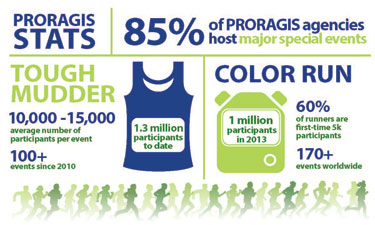 The Spartan Race. Tough Mudder. The Color Run. You’ve undoubtedly heard of these events, and there’s an ever-increasing likelihood that your community has hosted one or that you’ve participated yourself. The growth of these nontraditional race events in the past five years has been nothing short of meteoric, increasing almost 40-fold from 2009 to 2013 according to Running USA. In fact, these events are now more popular than half-marathons and marathons combined, with more than 4 million participants across more than 35 different themed or nontraditional events in 2013 (Running USA, 2014 State of the Sport: Non-Traditional Running Events).
The Spartan Race. Tough Mudder. The Color Run. You’ve undoubtedly heard of these events, and there’s an ever-increasing likelihood that your community has hosted one or that you’ve participated yourself. The growth of these nontraditional race events in the past five years has been nothing short of meteoric, increasing almost 40-fold from 2009 to 2013 according to Running USA. In fact, these events are now more popular than half-marathons and marathons combined, with more than 4 million participants across more than 35 different themed or nontraditional events in 2013 (Running USA, 2014 State of the Sport: Non-Traditional Running Events).
Eighty-five percent of the agencies that participated in PRORAGISTM in 2013 hosted major special events including races like the ones mentioned above. While these social-media-driven, fun-rather-than-competition-focused events are extraordinarily popular, they can present challenges for park and recreation agencies. For example, the City of Philadelphia has banned these types of events from city parks for a variety of reasons, including unforeseen cleanup for park agency facilities and schedule demands from local interests (Philadelphia Inquirer). For the most part, these events are for-profit endeavors (although some have affiliated charitable organizations), which can place agencies in a position of choosing between large and popular commercial events and local nonprofit organizations when considerations are made for scheduling, space or resources.
For many communities, the net effect of these events is positive. The large crowds drive economic activity near the race sites, and these events engage new participants in running and exercise-based activities that improve the health of communities. For example, 60 percent of Color Run participants have never before participated in a 5K race of any type (Running USA), and according to the Outdoor Industry Association, participation in these types of races is one of the top five most popular activities tried by first-timers (Outdoor Industry Association Outdoor Participation Report 2013).
Only time will tell if these nontraditional events continue to gain popularity, but chances are good that an eager organizer may want to host one in your city. It will be up to you to decide if the positive impacts will be worth the extra work required to host potentially thousands of people.
Travis Smith, Ph.D., is NRPA’s Vice President of Research.

